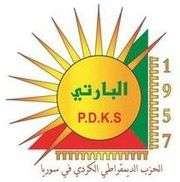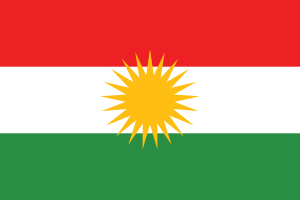Kurdistan Democratic Party of Syria
The Kurdistan Democratic Party of Syria (Kurdish: Partiya Demokrat a Kurdistanê li Sûriyê Kurdish: پارتی دیموکراتی کوردستان سووری; Arabic: الحزب الديمقراطي الكُردستاني- سوريا Hizb Al-Dimuqrati ِAl-Kurdistani fi Suriya), commonly known as KDPS or PDK-S, is a Kurdish Syrian political party founded in 1957 by Kurdish nationalists in northern Syria. The party is based in Hamburg, Germany and has various branches in France, United Kingdom, Sweden and the United States of America.
Kurdistan Democratic Party of Syria Partiya Demokrat a Kurdistanê li Sûriyê پارتی دیموکراتی کوردستان سووری الحزب الديمقراطي الكُردستاني- سوريا | |
|---|---|
 | |
| Leader | Saud Malla[1] |
| Founded | 1957 (In Syria) |
| Headquarters | Currently in Western Europe and the United States |
| Ideology | Kurdish nationalism Kurdish autonomy Liberal democracy Traditionalism |
| Political position | Centre |
| National affiliation | Kurdish National Council[2] |
| Party flag | |
 | |
| Website | |
| http://www.pdk-s.com/ | |
History
The party emerged from former members of a literary club, which promoted the use of the Kurdish language and was dissolved in 1956. Following, Osman Sabri and Abdul Hamid Darwish began to plan for the establishment of a Kurdish party. Sabri began to formulate a party program in the Kurdish language together with Jamal Talabani, who at the time has settled in Damascus in exile.[3] Osman Sabri , Nûredin Zaza and Abdul Hamid Darwish, along with some other Kurdish politicians, founded the Kurdistan Democratic Party of Syria (KDPS) on the 14 June 1957.[4] The parties secretary was Sabri , Nuredin Zaza became the first president in 1958.[4] The objectives of KDPS were promotion of Kurdish cultural rights, economic progress and democratic change. KDPS was never legally recognized by the Syrian state and remains an underground organization, especially after a crackdown in 1960 during which several of its leaders were arrested, charged with separatism and imprisoned. After the failure of political union with Egypt in 1961, Syria was declared an Arab Republic in the interim constitution. During the parliamentary elections of 1961, the KDPS won no seats in the Syrian Parliament. On 23 August 1962, the government conducted a special population census only for the province of Jazira which was predominantly Kurdish. As a result, around 120,000 Kurds in Jazira were categorized as foreigners even though they were in possession of Syrian identity cards.[5] In fact, the inhabitants had Syrian identity cards, which they were told to hand them over to the administration for renewal. However, those who submitted their cards received nothing in return. A media campaign was launched against the Kurds, with slogans such as Save Arabism in Jazira! and Fight the Kurdish threat!. These policies coincided with the beginning of Mustafa Barzani's uprising in Iraqi Kurdistan and the discovery of oilfields in the Kurdish-inhabited areas of Syria. In June 1963, Syria took part in the First Iraqi–Kurdish War by providing aircraft, armoured vehicles and a force of 6,000 soldiers against the Kurds. Syrian troops crossed the Iraqi border and moved into the Kurdish town of Zakho in pursuit of Barzani's peshmerga[6]
KDPS went through several divisions in the 1960s. Mustafa Barzani (the father of Mesud Barzani, the current president of Iraqi Kurdistan) attempted to reunify the party by inviting all the factions to Iraqi Kurdistan in 1970. During the meetings, Miro was chosen (and later re-elected in 1972) as the chairman of KDPS.
Syrian Civil War and Rojava Campaign
 |
|---|
| This article is part of a series on the politics and government of Autonomous Administration of North and East Syria |
|
Legislature and Government |
|
Elections
|
|
|
Party alliances
|
|
The KDPS did not join the Syrian National Council at first, Secretary-General Abdulhakim Bashar seeing this body as too influenced by the country of Turkey. He demanded guarantees for the Syrian Kurdish population by the SNC and, in turn, stated Turkey's obligation to grant full rights to its own Kurdish population.[7] Following disputes with the dominant Kurdish party in Syria, the Democratic Union Party (PYD), the KDP-S however later led the Kurdish National Council (ENKS) to join the SNC.
To counter the PYD's dominance in the Kurdish National Council (ENKS), the KDP-S set up an alliance named Kurdish Democratic Political Union in late 2012. The strategy however failed and even backfired ultimately driving other ENKS members into cooperation with the PYD.[8] In early April 2014, the Kurdish Freedom Party in Syria (Partiya Azadî ya Kurdî li Sûriyê, or Azadî), and three other parties merged into the KDP-S.[9]
In Syria, the constitution states that political parties cannot be founded on ethnic, religious, regional and tribal basis, which has been one of the pretexts used to persecute Kurdish political organizations.
See also
- List of armed groups in the Syrian Civil War
References
- "The Kurdish Democratic Party in Syria (al-Parti)". Carnegie Middle East Center. 20 February 2012. Retrieved 17 May 2014.
- "The Kurdish National Council in Syria". Carnegie Middle East Center. 15 February 2012. Retrieved 17 May 2014.
- Allsop, Harriet (2014). The Kurds of Syria. I.B. Tauris. p. 74. ISBN 9781780765631.
- Allsop, Harriet (2014), p.75
- Hassanpour, Amir (1992). Nationalism and Language in Kurdistan. San Francisco: Mellen Research University Press. pp. 137–138. ISBN 0773498168.
- I. C. Vanly, The Kurds in Syria and Lebanon, In The Kurds: A Contemporary Overview, Edited by P.G. Kreyenbroek, S. Sperl, Chapter 8, Routledge, 1992, ISBN 0415072654, pp.151-2
- "Syrian Kurd Leader: Revolution Won't Succeed Without Minorities". The Atlantic. 20 January 2012. Retrieved 17 May 2014.
- Bruneau, Eric (30 August 2013). "KDP's failed meddling in Syrian Kurd politics". Kurdistan Tribune. Retrieved 1 November 2015.
- "'PYD political thought resembles that of Baath Party': Kurdish politician". ARA News. 14 May 2014. Archived from the original on 19 September 2017. Retrieved 17 May 2014.